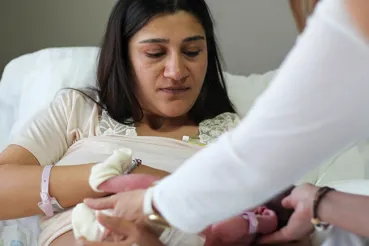Every kid has suffered through a few bad tummy aches. But when a child's digestive problems escalate into a dramatic change in bowel habits, crampy abdominal pain and a lack of energy, something more serious may be going on.
Inflammatory bowel disease includes two chronic digestive conditions, Crohn's disease and ulcerative colitis. Both cause ongoing inflammation of the gastrointestinal (GI) tract.
While ulcerative colitis is limited to the inner lining of the large intestine (the colon), Crohn's disease may occur anywhere in the GI tract, including the small intestine, large intestine, rectum or mouth. Although inflammatory bowel disease is most common between the ages of 15 and 30, there has been a dramatic increase among children in the past few years.
It's not clear, however, whether the increase is due to a change in the incidence of the disease or that pediatricians are now recognizing that children can have this disease too.
What's going on?
Crohn's disease and ulcerative colitis are autoimmune disorders in which a person's immune system mistakenly attacks healthy body tissues. This reaction causes an inflammatory response that occurs within the GI system.
Chronic inflammation leads to symptoms that can come and go with periods of flare-ups. The most common symptoms include abdominal pain, blood in the stools, fever, fatigue, loss of appetite, persistent diarrhea and weight loss.
An overall lack of energy is another subtle sign that can tip parents off to a problem. If your child isn't going out to play, isn't eating well and is complaining of stomach aches, that can signal a problem, including inflammatory bowel disease.
While the causes of inflammatory bowel disease are still unknown, environmental factors, diet and family history are thought to play a role. In fact, about one-third of patients who have inflammatory bowel disease also have a first-degree (parents or siblings) or second-degree (grandparents, aunts or uncles) relative who has the disease.
Getting kids well
Living with inflammatory bowel disease can be hard on young patients and their families. Children may have a hard time understanding what's happening to them. They may miss a lot of school and feel embarrassed by their condition.
The key is to provide kids with the treatment, comfort and encouragement they need to feel better, allowing them to enjoy a happy, more carefree childhood.
Both Crohn's and ulcerative colitis are chronic conditions. However, medications can help children go into remission for long periods of time.
Although there is currently no medication that can cure inflammatory bowel disease, there have been significant improvements in medications used to treat the symptoms of Crohn's disease and ulcerative colitis in children: The most common are corticosteroids, which decrease inflammation, and drugs that suppress the immune system to prevent further inflammation.
The pros and cons of medications
While these medications are often highly effective in relieving symptoms, a big concern with children is that these medications can slow growth and decrease stature. Adding to that, the diseases themselves can actually interfere with children getting the nutrients they need from food, which further slows growth and may delay puberty.
To prevent these complications, young patients are typically on steroids like Prednisone for less than three months, with a maximum of six months. Doctors aim to strike a balance between keeping children on medications with the risk of slowed development vs. doing surgery, which is invasive and has risks. The primary goal of treatment is always to control symptoms and allow children to grow up normally.
Medications used to treat inflammatory bowel disease also put children at risk for other types of infections and diseases. The most serious concern with immunosuppressant medications is the threat of developing certain cancers, particularly lymphomas and leukemias. But more research is needed to determine how significant the risk is.
If left untreated, Crohn's disease and ulcerative colitis can lead to chronic and sometimes dangerous complications, such as infections, intestinal bleeding, liver problems, malnutrition and other health problems.
The key is to provide kids with the treatment, comfort and encouragement they need to feel better, allowing them to enjoy a happy, more carefree childhood.
Surgical solutions
Although medications can be effective in putting inflammatory bowel disease into remission, about 30 percent of people with ulcerative colitis and 70 percent of people with Crohn's require surgical treatment at some point in their lives. Surgical interventions can help relieve many symptoms and, in some cases, cure the disease.
Some of the most common reasons for surgery are inadequate response to medications with continued symptoms and inability to get off medications without developing significant symptoms again. In addition, when patients develop fistulas, bleeding problems, or a narrowing of the bowel, which occurs when scar tissue forms as a result of chronic inflammation, they may need surgery.
The goal of surgery is to eliminate the disease and restore function. For example, ulcerative colitis can essentially be cured by removing the colon and rectum. Colorectal surgeons can create an internal pouch using part of the small intestine, allowing patients to have semi-regular bowel movements without a permanent ileostomy (an external pouch/bag system for waste).
Surgical procedures for Crohn's disease offer treatment for the consequences of the disease — such as narrowing of the bowel with symptoms of blockage. However, surgery does not cure Crohn's disease.
For instance, to treat narrowing of the bowel, a surgeon can perform a surgical procedure called a strictureplasty that opens up the narrowed area. The surgery offers patients relief from significant cramping and bloating issues associated with the condition.
Making surgery easier on kids
Minimally invasive approaches, such as laparoscopy, have made colorectal surgeries easier on children. A laparoscopic procedure is a modern surgical technique that uses small incisions rather than larger incisions used in traditional surgeries.
These are still major surgeries, but the benefit of doing them laparoscopically is that there is less pain, faster recovery, less time in the hospital and a better cosmetic outcome.
Surgery can make a significant difference in a child's quality of life as well. After surgery, the child starts feeling better. They then start eating normally, gain weight and typically become much more sociable.
While these are challenging and sometimes painful conditions, children with inflammatory bowel disease can live quite happy and productive lives. The key is for families to get the care and support they need every step of the way.




